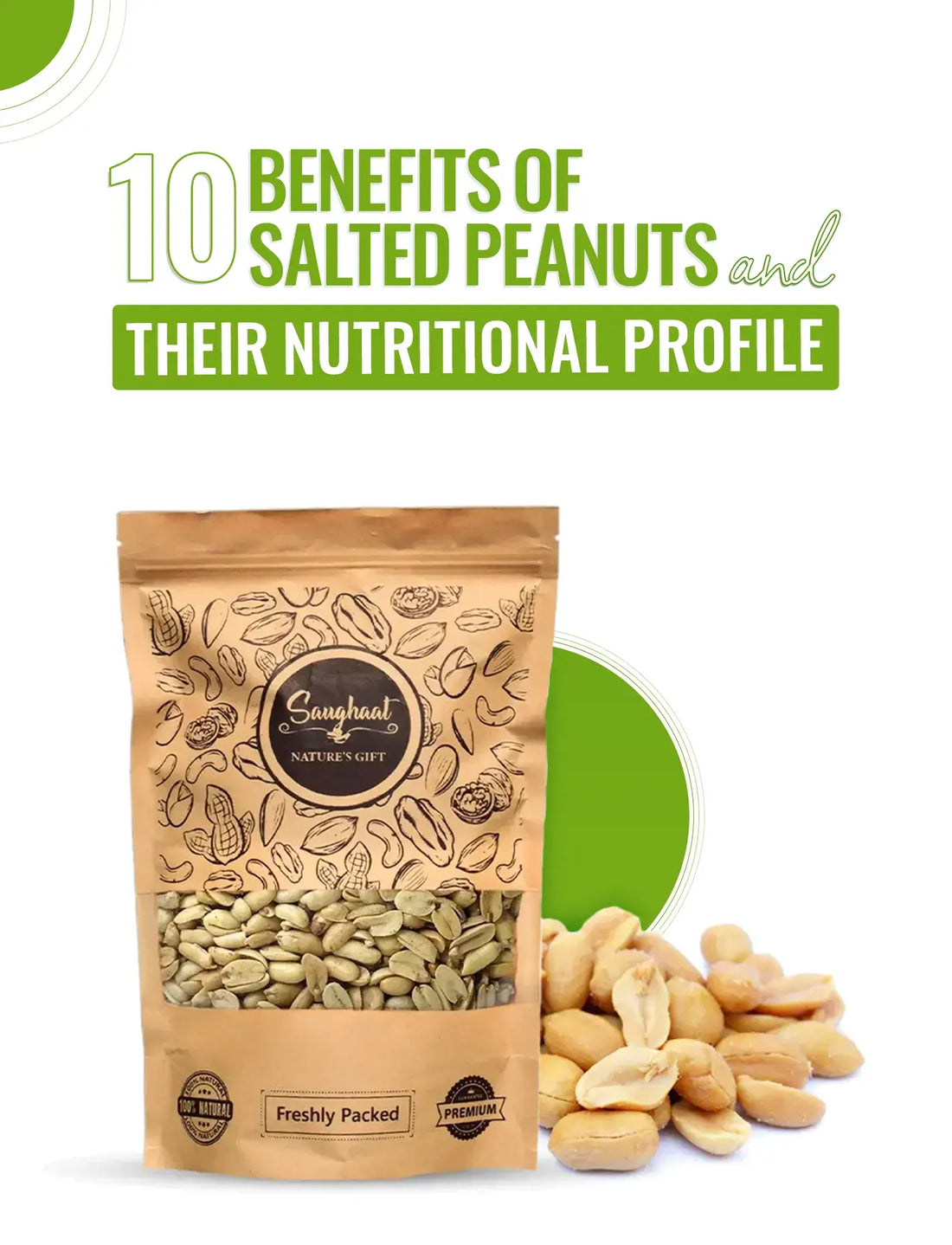
10 Benefits of Salted Peanuts and their Nutritional Profile
Share
Peanuts offer a myriad of health benefits, making them a valuable addition to a balanced diet. Packed with plant-based protein, salted peanuts support muscle development and provide sustained energy.

Nutritional Profile of Salted Peanuts:
- Healthy Fats: These peanuts are abundant in heart-healthy fats, particularly monounsaturated and polyunsaturated fats. These fats play a crucial role in maintaining cardiovascular health by reducing levels of LDL (low-density lipoprotein) cholesterol. The presence of oleic acid, a monounsaturated fat also found in olive oil, further enhances their cardiovascular benefits.
- Protein Content: Protein, the building block of tissues and muscles, is a significant component of these peanuts. This makes them an excellent choice for those looking to incorporate plant-based protein into their diet. The protein content not only supports muscle health but also contributes to a feeling of fullness, aiding in weight management.
- Carbohydrates: The carbohydrate content in these peanuts provides a quick and efficient source of energy. The combination of complex and simple carbohydrates ensures a sustained release of energy, making them an ideal snack for a quick pick-me-up during the day.
- Micronutrients - Vitamins: They are a treasure trove of essential vitamins. Vitamin E, a potent antioxidant, is present in abundance, promoting skin health and protecting cells from oxidative stress. B vitamins, including niacin, riboflavin, and folate, contribute to energy metabolism and overall well-being.
- Micronutrients - Minerals: Essential minerals like magnesium and phosphorus are found in these peanuts, supporting various bodily functions. Magnesium, for instance, is crucial for bone health, muscle function, and energy production. Phosphorus plays a role in forming strong bones and teeth.
- Fiber: Fiber is a key component contributing to digestive health. These peanuts provide a significant amount of dietary fiber, aiding in regular bowel movements and promoting a healthy gut. This can be particularly beneficial for individuals looking to maintain or improve their digestive well-being.
Benefits of Consuming Peanuts:
- Heart Health: The monounsaturated and polyunsaturated fats found in these super crisp peanuts play a pivotal role in cardiovascular health. These heart-healthy fats help lower levels of LDL (low-density lipoprotein) cholesterol, commonly known as "bad" cholesterol. By promoting a healthier lipid profile, peanuts contribute to reducing the risk of heart diseases, such as coronary artery disease and stroke.
- Weight Management: Despite being calorie-dense, peanuts can be a valuable ally in weight management. The combination of healthy fats and protein creates a satiating effect, curbing excessive hunger and preventing overeating. The sustained release of energy from the macronutrients helps maintain a feeling of fullness, making it easier to control calorie intake and support weight loss or maintenance efforts.
- Energy Boost: The balanced macronutrient content in these crispy peanuts, comprising healthy fats, protein, and carbohydrates, provides a sustained and efficient energy boost. Unlike snacks high in refined sugars that offer a temporary energy spike followed by a crash, peanuts contribute to stable energy levels, making them an ideal choice for combating fatigue and maintaining vitality throughout the day.
- Antioxidant Properties: Peanuts are rich in antioxidants, including resveratrol, which has been associated with various health benefits. These antioxidants combat oxidative stress in the body, neutralizing free radicals that can contribute to chronic diseases and aging. By incorporating these peanuts into your diet, you support your body's natural defense mechanisms and promote overall well-being.
- Improved Digestion: The fiber content in these super crisp peanuts is essential for maintaining digestive health. Dietary fiber adds bulk to the stool, preventing constipation and promoting regular bowel movements. Additionally, fiber acts as a prebiotic, nourishing beneficial gut bacteria and contributing to a healthy gut microbiome. A well-functioning digestive system is key to overall health and well-being.
- Bone Health: These nuts contribute to bone health through essential minerals like magnesium and phosphorus. Magnesium is crucial for bone formation and density, while phosphorus plays a role in the mineralization of bones and teeth. Including these nutty peanuts in your diet can support the maintenance of strong and healthy bones, reducing the risk of osteoporosis and fractures.
- Skin Health: The presence of vitamins E and B in these peanuts enhances skin health. Vitamin E is a powerful antioxidant that protects the skin from oxidative damage, reducing the signs of aging. B vitamins, including niacin (B3), contribute to maintaining healthy skin by supporting cellular repair and promoting an even complexion. Consuming these peanuts can contribute to a radiant and youthful skin appearance.
- Blood Sugar Regulation: Despite their natural sweetness, these crunchy peanuts have a low glycemic index. This means they cause a slower and more gradual increase in blood sugar levels compared to high-glycemic foods. For individuals monitoring blood sugar levels, incorporating these peanuts into their diet can be a sensible choice to help regulate glucose levels and reduce the risk of insulin spikes.
- Stress Relief: The combination of nutrients in salted peanuts, including healthy fats, protein, and various vitamins and minerals, contributes to stress reduction. These nutrients play a role in the production of neurotransmitters and hormones that regulate mood and stress response. Including these peanuts in your diet can be a delicious and nutritious way to support overall mental well-being.
- Nutrient Absorption: The healthy fats in peanuts aid in the absorption of fat-soluble vitamins, including vitamins A, D, E, and K. These vitamins are essential for various bodily functions, including immune system support, bone health, and skin health. Maximizing the absorption of these vitamins enhances the overall nutritional benefits of your diet.

Addressing Concerns About Sodium Content:
- Choose salted peanuts with lower sodium content by carefully reading product labels.
- The key to incorporating these peanuts into a healthy diet is moderation.
- Drinking enough water is crucial, especially when enjoying salted peanuts.
- For those with hypertension or specific dietary restrictions, exploring alternatives to traditional salted peanuts is advisable.
Conclusion:
Salted Peanuts, despite their calorie density, are the combination of healthy fats and protein that helps control appetite, contributing to weight management. Overall, peanuts offer a delicious and nutritious package, providing an array of health benefits when consumed in moderation.
